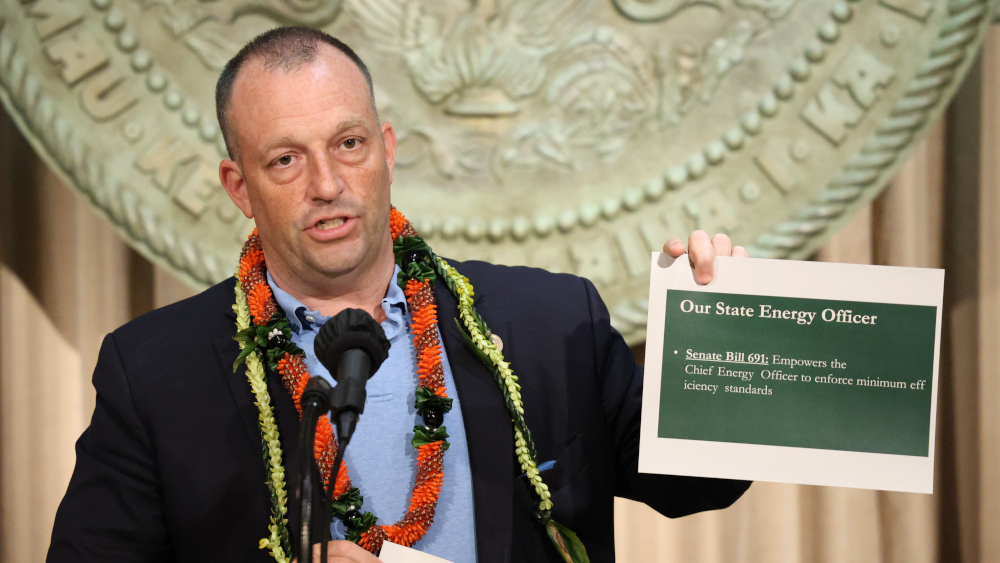(BIVN) – Several bills related to clean energy were signed into law on Wednesday, which the State says will “help combat climate change and work towards the state’s zero-emission goal of 100-percent clean energy by 2045.”
“Today we are taking action to build a clean energy future by signing bills that will create more standards for efficiency, protect our environment, and create more opportunities for collaboration,” said Governor Josh Green. “It’s important to identify our vulnerabilities and then develop strategies to reduce carbon emissions and other pollutants that adversely affect our environment.”
These bills were made law:
SB691 SD2 HD2 CD1, (Act 224) Relating to Efficiency Standards
Chief Energy Officer minimum efficiency standards
Allows the chief energy officer of the Hawaiʻi state energy office to enforce minimum efficiency standards and adopt or amend efficiency standards. Sets minimum efficiency standards for portable electric spas, residential ventilating fans, toilets, urinals, and water coolers. Allows manufacturers to utilize the Home Ventilating Institute’s certified products directory certification program to meet certain standards. Effective 6/30/2023. (CD1)
HB192 HD2 SD1 CD1, (Act 225) Relating to Energy Efficiency
Prohibits the sale of certain fluorescent lamps
Prohibits the sale of certain fluorescent lamps as a new manufactured product, with certain exemptions. (CD1)
SB1024 SD2 HD1 CD1, (Act 226) Relating to Transportation
Zero-Emissions transportation goals
Establishes long-term goals for zero-emissions transportation in Hawaiʻi and abroad to reduce and eliminate transportation emissions. Establishes the clean ground transportation working group and the interisland and clean transportation working group. Requires reports to the Hawaiʻi Climate Change Mitigation and Adaptation Commission and the Legislature. Effective 7/1/2023. (CD1)
SB1417 SD1 HD1 CD1, (Act 221) Relating to Climate Change
Kakaʻako climate change and sea level rise
Requires the Hawaiʻi Community Development Authority to consider the impacts of climate change, sea level rise, and climate-resilient development in the design and siting of buildings in the Kakaʻako and Kalaeloa community development districts. (CD1)
SB1534 SD2 HD3 CD1, (Act 222) Relating to Transportation
Electric vehicle road usage charge
Creates a mileage-based road usage charge to replace state motor fuel taxes beginning on July 1, 2025, for electric vehicles. Eliminates the $50 annual state vehicle registration surcharge for electric vehicles. Allows electric vehicle owners to pay a registration surcharge or a per-mile road usage fee until June 30, 2028. Requires certificates of inspection to state the odometer reading of vehicles. Requires motor vehicle registration applications to specify whether the type of fuel for which the vehicle is adapted is battery electricity. Requires the Department of Transportation to plan for the deployment of a state mileage-based road user charge program by 2033 and submit a report to the Legislature. Appropriates funds. (CD1)
SB1173 SD1 HD2, (Act 223) Relating to Vehicles
Vehicle emissions penalties
Prohibits a person from causing a diesel- or gas-powered vehicle to discharge clearly visible smoke, soot, or other exhaust emissions onto another person or motor vehicle. Establishes a minimum $500 fine for violators. (HD2)
“These bills will provide direct savings to Hawaiʻi’s families and businesses by lowering energy costs, will benefit the electric grid by reducing demand, will reduce toxic waste in the environment, and will avoid hundreds of thousands of tons of carbon emissions,” said Nicole Lowen, chair of the House Committee on Energy and Environmental Protection (District 7, Kailua-Kona, Honokōhau, Kalaoa, Puʻu Anahulu, Puakō, portion of Waikoloa). “Measures like these are the true steps forward where we put one foot in front of the other and start making real change in the real world,” she said.


by Big Island Video News7:11 am
on at
STORY SUMMARY
HONOLULU - Governor Green enacted laws working towards the state’s zero-emission goal of 100-percent clean energy by 2045.